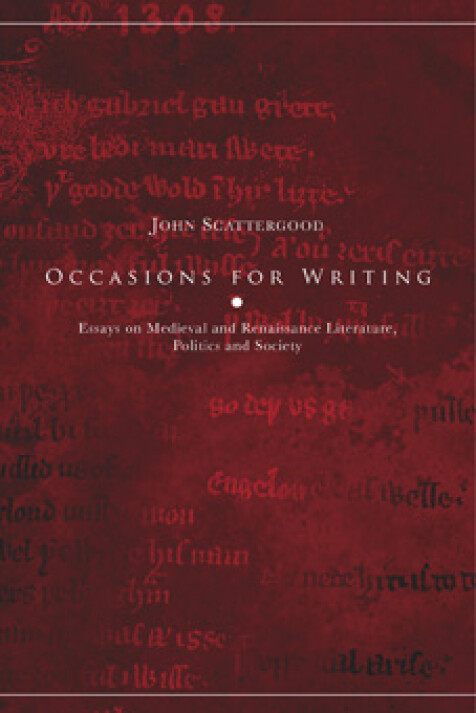Occasions for writing
Essays on medieval and renaissance literature, politics and society
John Scattergood
‘A valuable new collection of papers from a scholar to whom we are all indebted', Anne Hudson, Medium Ævum (2013).
‘This volume is a snapshot of Scattergood’s finest recent work … the individual essays provide instant rewards … Scattergood’s contextual knowledge is second to none. Respect for literary ambiguity and an acute sense of the instability of early texts qua texts have always formed the tip of Scattergood’s sharp and perceptive readings. By showcasing his impressive body of enduring criticism on medieval and early modern culture, this collection demonstrates that Scattergood stands out as one of the great chroniclers of change in an inspiring generation of scholars', Sebastian Sobecki, English Studies (2012).
‘Few scholars have studied the intersections between literature and history in the writings of the Middle Ages and early modern periods for as long and as fruitfully as John Scattergood. There are at least two distinctive strengths to his analyses. One is his grasp of historical and legal materials as sources for illuminating literary texts ... The other is his capacity for close and careful literary analysis, for grasping the nuanced implications of a particular word or phrase in the social or political contexts in which it is deployed. Both these qualities are used to particular effect in the twelve essays included here, which are striking in the range of their preoccupations, extending from Andreas Capellanus to John Leland, and from medieval references to time to early cartography … this is a stimulating collection, enriched by a lifetime’s wide reading and deep thinking. It recurrently demonstrates how a proper awareness of historical context can enrich our understanding of medieval English literature', ASG Edwards, Times Literary Supplement (January 2011).
‘Professor Scattergood’s most recent collection of essays testifies to the extraordinary breadth and scope of his interests and scholarship. Chronologically the literary texts which form the subject of these essays span almost half a millennium … in an academic environment which promotes and increasingly narrow period specialisation, it is both refreshing and reassuring to read the work of a scholar with such catholic tastes and interests, and Professor Scattergood unfailingly writes not only authoritatively but engagingly about this very disparate body of material. Amid this plurality of interests an underlying sense of coherence does emerge … in these essays, historical context informs and enriches an understanding of literature, but literary texts are also seen as participating in and seeking to affect the historical process … a book rich in insight and understanding', David Salter, Bulletin of the Society for Renaissance Studies (April 2011).
‘[The chapter] “Writing the clock: the reconstruction of time in the late Middle Ages” is a fascinating piece on the mechanical clock and its wider cultural ramification. It also shows that the author is extremely widely read and references numerous literary and historical events with great facility … Scattergood excels in taking little-known poems and furnishing engrossing, well-researched essays. There should be something valuable and worthwhile for most medieval and Renaissance scholars in this volume', Anita Obermeier, Mediaevistik (2013).
‘The sheer breadth of Scattergood’s knowledge and examples – he feels at home with nearly every European language and its literature – and the fact that he draws material from the time of Beowulf though the age of Dickens, makes it difficult to find fault with his arguments. Overall, this collection provides forceful interpretations of many less well-known works of medieval and early modern literature while simultaneously reminding us of the importance of meticulous historical research', Joseph Turner, Kritikon Litterarum (2011).
‘The eclecticism of this volume, spanning as it does the medieval and renaissance world from the twelfth-century court of Champagne to the sixteenth-century Henrician court in England, is bound to offer something of interest to any potential reader … One of the most admirable features of this book is its breadth of reference. From lyric to propagandist text, from treaty to religious journeying along with Langland’s Piers Plowman, the tone is assured and persuasive ... Throughout the volume, and in the essays dealing with these last-mentioned topics, there is a solid grasp of the historical and political circumstances which promoted literary composition. Occasions for Writing is a challenging read, but one which faithfully exemplified the medieval ethos of reading being for both profit and pleasure', Carol M. Meale, The Ricardian (2011).

